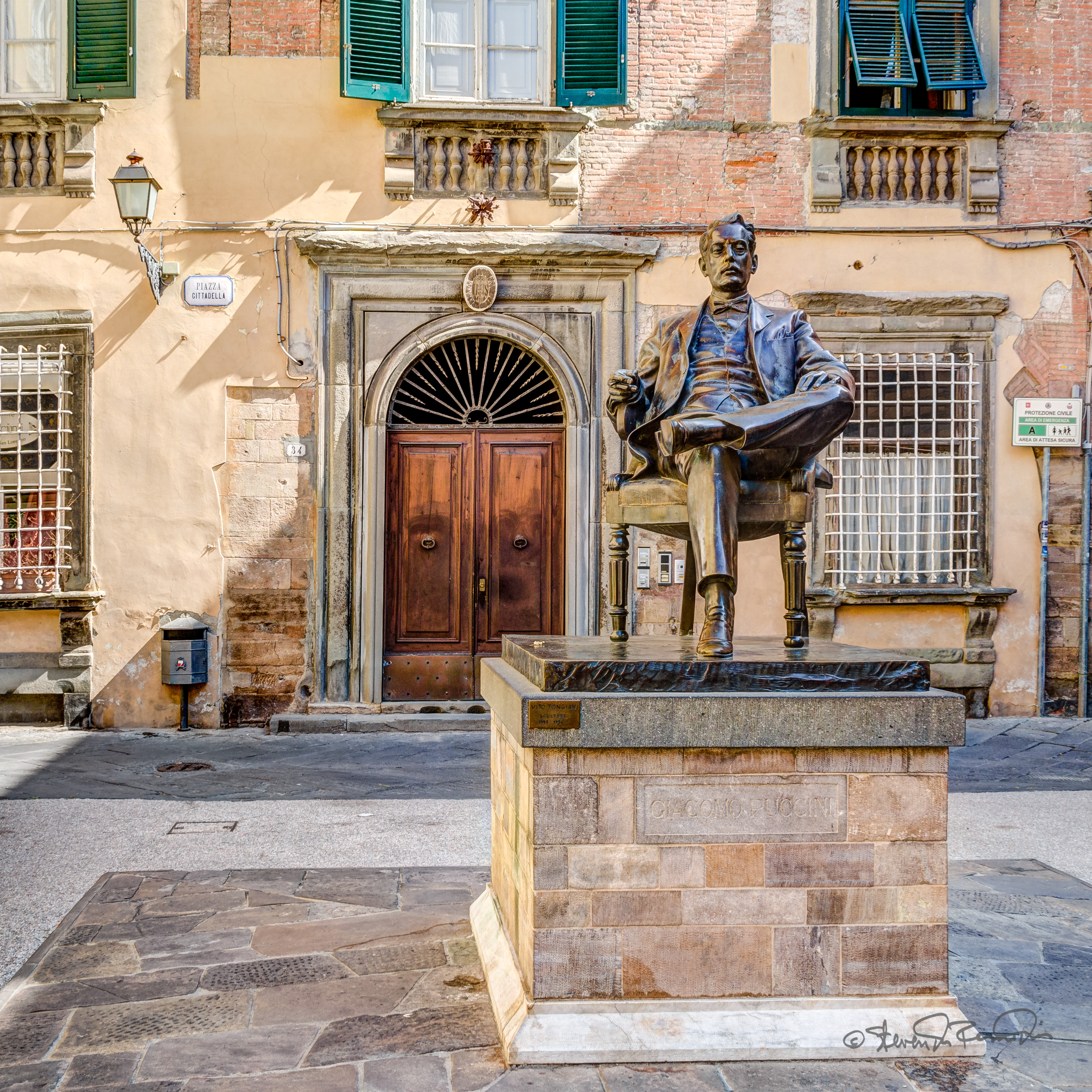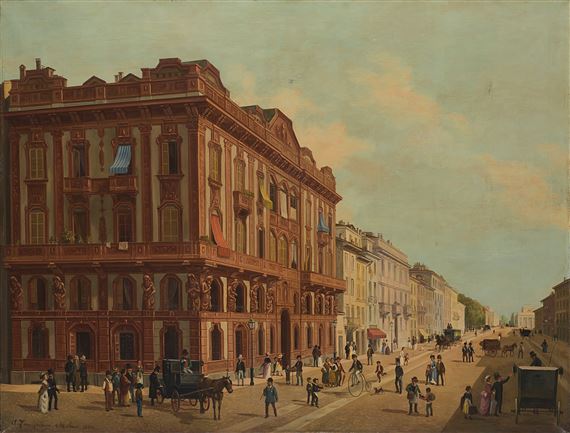 |
He was born in Lucca, Tuscany, on November 22nd, 1858. Son of Michele Puccini and Fortunata Magi. He was the sixth of seven brothers, as a child he hated music. However, he came, like Bach, from a family of musicians. Then he learned to play the organ like all the Puccini who were organists and chapel teachers in the cathedral of Lucca.
When he was 6 years old his uncle Fortunato incorporated him into the chapel choir and as Giacomo continually detuned, he declared that he had no aptitude for music. Then he studied organ where he obtained very good results taking over the position of his father as organist and chapel teacher of the cathedral of Lucca.
In 1878 he traveled to Pisa to the presentation of the Verdi opera, Aida, where he was so dazzled that he decided to leave his post as organist and dedicate himself to composing operas. He was then 20 years old. Later, thanks to a pension from Queen Margarita, Puccini was able to study at the Milan Conservatory.
During his stay in Milan as a student, he had to subsist in the bohemian environment. Puccini was poor and lived in a dingy attic, where he managed to cope with his poverty with the help of the optimism that his youth gave him. Someday he would write an opera that would remember the hungry dwellers in the garrets and translate their sufferings into beautiful songs. A story very similar to his magnificent opera La Boheme.
In 1883, encouraged and protected by Ponchielli, he finished his first opera "Le Villi" about the peasants from the German black forest. He presented him to a contest in which his friend Pietro Mascagni also participated, but Puccini's work did not even get an honorable mention. On the contrary, the work of Mascagni won, it was "Caballeria Rusticana". Later Le Villi was released and with great success.
In 1889, he finished his second opera "Edgar", but the script was deficient and received numerous criticisms.
In 1893, Puccini began composing Manon Lescaut, inspired by the novel of the same title written in 1731 by the French abbot Prévost, which narrates the love relationship between a courtesan and a knight. Puccini would thus turn the love story into a dramatic opera, in which the psychology of the protagonist -as would be the case in his mature works- La Boheme, Tosca, Madame Butterfly and La Fanciulla del West.
La Boheme
After two years, in November 1895, he finished composing La Boheme. Reunited with his friends, Puccini spoke to them: "Gentlemen, I have the honor of introducing you to Mimi, the girl who sold her body for a few dresses and a carriage. But she is immortal, because she loved with a heart capable of reaching the sacrifice. I'm going to play you the scene of death, which I just finished. " When they heard the music, his friends couldn't hide their emotion. "You will also be immortal with Mimi" commented one of them. Puccini smiled. "Maybe" he said.
La Boheme's script is based on a novel by Henry Murger. It is the story of hungry young bohemians who lived in the Latin Quarter of Paris. Puccini's opera was simple and human and he knew how to turn a humble theme into noble melodies. When it was premiered at the Regio Theatre in Turin, on February 1st, 1896, it was not very well received, however two years later it was definitively imposed.
Tosca
The writer Luigi Illica presented Puccini with Tosca's script so that he could put music on it, to which he refused. Illica then gave it to another musician, however Puccini became obsessed and claimed the script from the writer. Finally, on January 14th, 1900, Tosca was premiered at the Constanzi Theatre in Rome, with great success.
Madama butterfly
In 1902, Puccini started the composition of Madama Butterfly, whose plot is based on a John Luther Long novel, dramatized by David Belasco. The librettists were Illica and Giacosa, friends of the musician who had previously written the librettos for Tosca and La Boheme. The new play premiered on February 17th, 1904, at the La Scala Theatre in Milan.
Elegance, attractiveness and wit made Puccini irresistible to many women. One of them, Elvira Bonturi left her husband forever and lived with Giacomo for 18 years. When her husband passed away, she legally joined the composer. The couple lived in Monza, where their son Antonio was born and in 1890 they moved to Milan. Puccini, even when married, was not without romantic adventures, he loved his wife but this did not prevent him from meeting other ladies when the opportunity presented itself.
But her partner Elvira was a very jealous woman, that's how in 1908, after spending their summer holidays together in Cairo, there was an authentic family drama. For no apparent reason, Elvira began to feel terrible jealousy of Doria Manfredi, a young woman who worked years ago at her house as a servant. The idea that Doria and Giacomo were lovers obsessed Elvira, one day fired her and threatened to kill her.
Prey to despair Doria committed suicide by taking poison. A doctor, at the request of his parents, examined the body and certified that she was a virgin. The Manfredi filed a complaint against Elvira and was found guilty. Looking for a way out of the problem, Puccini compensated Doria's family, who dropped the charges and his wife was able to save herself from prison.
The latest success and decline.
On December 10th, 1910, La Fanciulla del West was premiered at the Metropolitan Opera House in New York, under the direction of the brilliant and controversial Arturo Toscanini and with the performance of the most famous tenor of the moment: Enrico Caruso. It was the last work of Puccini's period of maturity, and it was a resounding success. Also known in English as The Girl from the Far West, this three-act opera was based on a libretto by Carlos Zangarini and Guelfo Civinini.
The action of La Fanciulla del West takes place in a mining area of the western United States, during the gold rush, in 1850. Despite the success of the premiere, this opera was forgotten. Although it dramatically suffers from certain flaws, it is a masterpiece for its original, even bold, harmonic language and imaginative and brilliant orchestration. The so-called "bandit's aria" -Chélla mi creda libero e lontano- constitutes a true anthology piece.
The autumn in Puccini's life was warm, but without great events. The best of his musical harvest had already been collected. At the age of 67, when he worked in Turandot, an exotic and modern opera that told the story of a beautiful and cruel Chinese princess, the musician had to interrupt his work, suffering from a throat condition.
The doctors who recognized him verified that he had a cancerous tumor. He was attended by the best specialist in Europe, radio treatments were applied, obtaining good results. He was improving from his ailment, when he suddenly died of a heart attack in Brussels on November 29th, 1924. His mortal remains were transferred to a family pantheon in Torre del lago.
Last Tribute
Turandot, which was completed by Franco Alfano, premiered at the Scala in Milan on April 25th, 1926. It was a memorable night. All intellectual Italy was present. The opera was performed that day without the final scene added by Alfano. The orchestra was directed by none other than Arturo Toscanini. When the last note composed by Puccini was sounded, the lights in the room went out and in the dark and in the most moving silence, these words of Toscanini were heard: "Here ends the music of the teacher" (according to others: "Here the teacher died"). Then the light came on again and the public paid the last tribute to Puccini with a huge ovation.







